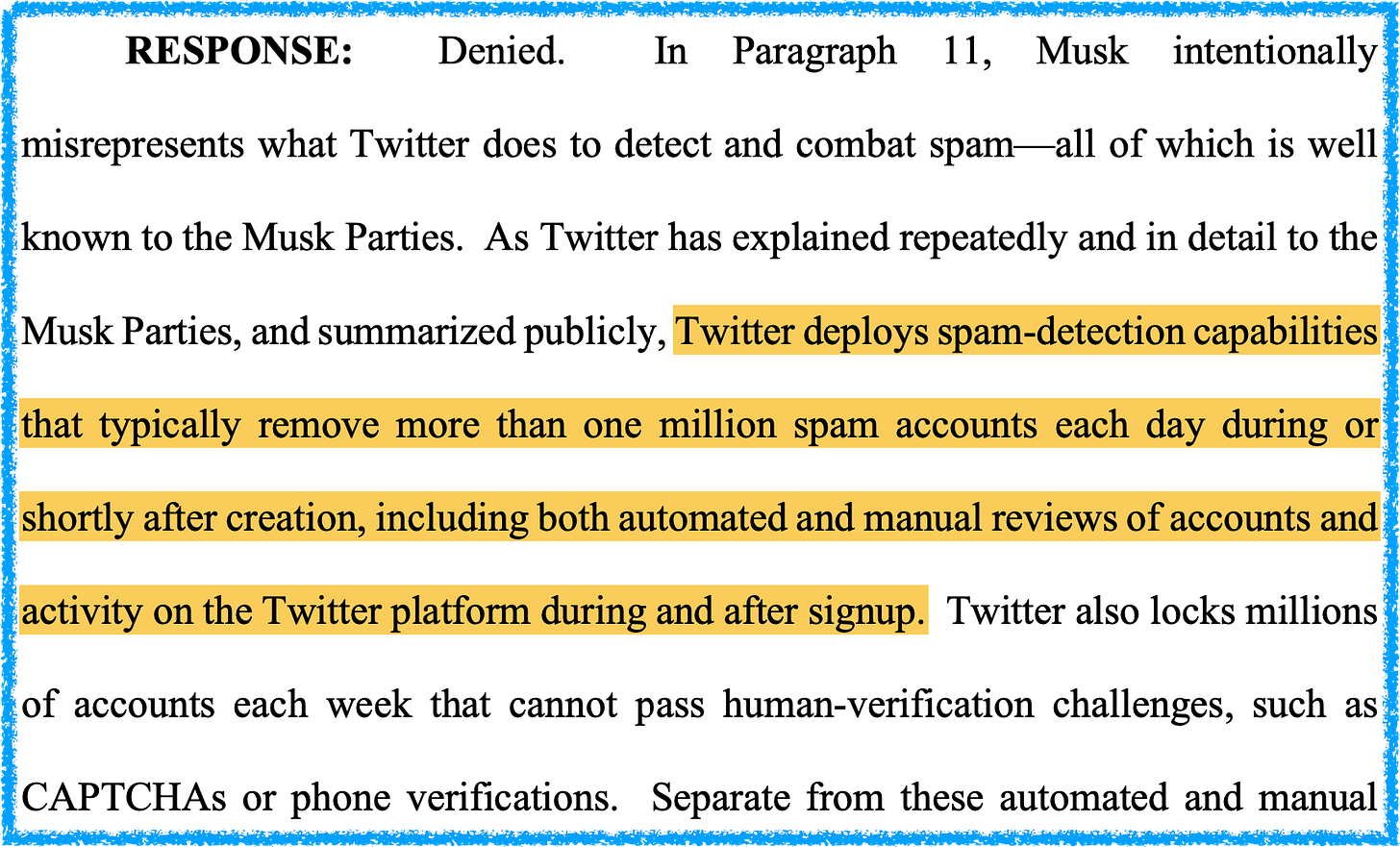Musk v. Twitter: Oh my Fraud!
Last week Musk filed his countersuit to the Twitter action under seal, with Twitter’s public response following shortly thereafter. This response included some boilerplate placeholders, some salacious snippets, and a few things that are kind of both (“unclean hands,” sounds so much more dramatic than the standard legal defense it actually conveys).
Before we talk specifics, it may be helpful to talk about the basic mechanics of Twitter’s response. When responding to claims like these, it is customary to go paragraph-by-paragraph of a complaint and do one of three things for every fact or allegation presented: (1) admit, (2) deny, or (3) refuse to answer based on lack of knowledge or information. One short paragraph in a complaint could require all three. And because anything which is not expressly denied is considered admitted, lawyers spend quite a lot of time parsing out the complaint, and the responses are regularly hundreds of pages of boilerplate text (e.g., “Company X neither admits nor denies on the grounds that it does not have sufficient information regarding the assertions in paragraph xx”). Being a lawyer is nothing like Suits.
So what did we learn, besides the fact that some Wachtell junior associates had “insufficient knowledge or information” burned into their minds while their friends got sunburned in their Hamptons cabanas?
I learned I don’t need a Netflix subscription through October. I also learned I have a different relationship with my friends than Elon Musk has with his. A couple of weeks ago I said that friends don’t typically accuse friends of fraud. But there is an exception to every rule. And Elon Musk is nothing if not exceptional.
Musk presents five counts against Twitter. And if a lengthy brief asserting claims based on attenuated statistical analysis and legal misdirection can be called “guns,” then Musk came out guns blazing.
Count I: FRAUD
Ok, maybe this wasn’t wholly unanticipated—we did say “Musk loses unless he can prove fraud” last time—but it’s still a little crazy, right? I just want to reiterate that Musk and Jack Dorsey are friends. At least, they were before Musk’s latest attempts to buy Twitter for a song. I hope Jack reads the countersuit carefully. Where once there was a whisper, now there is a chorus. “Fraud” itself appears at least five times in Musk’s countersuit based on my reading of Twitter’s response.
For the Twitter shareholder, the real question is whether or not there is merit to Musk’s argument now that he has given it a name. There isn’t. Twitter brushes off the allegations succinctly through categorical denials across pages 116-118 of the response. The foundations for Musk’s arguments are old hat now, and I can’t see anything that gives me reason to believe Musk has an ace up his sleeve.
The other counts are based on breach of contract and violation of a Texas securities law. It’s largely uninteresting at this stage, and the whole thing reads a little wonky. For those wondering why Musk is suing under a Texas securities law, the answer is simply that Musk resides in Texas, and the Texas securities law “Tex. Gov’t Code § 4008.052 et. seq” is more or less the state version of the 10b-5 claim (securities fraud). The breach of contract claims (Counts III and IV) are rooted in the same information rights and “ordinary course of business” points we previously discussed.
Rather than going through every admission, denial, and “I dunno,” here are a few other things I learned (addressed in somewhat response-chronological, somewhat whimsical order):
1) Musk likes to play chess against himself.
So the argument is what, exactly? Musk can’t close the transaction because there are more bots within the mDAUs than he thought, but also the mDAUs aren’t very important? Checkmate, Mr. Musk. Wait—shit.
2) Occasionally, lawyer’s get to make jokes.
Very dry jokes. Paragraph 4 of Musk’s countersuit says that Musk believes in free speech and only buys companies with products he uses and enjoys.
It’s standard practice to admit only the most undeniable basics in response to any claim (and assert lack of sufficient knowledge or information for most everything else), but Twitter’s response is still golden.
3) Twitter pulls the old “switcheroo,” accuses Musk of his own misrepresentations.
Remember how Musk was “flabbergasted” because Twitter didn’t use automation/machine learning/an Nostradamus-octopus to identify and eliminate bots?
Twitter isn’t having it.
4) Twitter calls Musk unsophisticated.
Not only does Twitter refute Musk’s assertion that its own calculations are rudimentary, Twitter suggests Musk is the one who could use some schooling.
5) Metaphors are fun.
The law, not so much.
That’s all for now. I will continue to update as we get more information. Perhaps one day I’ll get the chance to write about something else. But today is not that day.
*Because I have mentioned investment arbitrage, and in the interest of transparency and objectivity, I should say that I am now long Twitter. As Twitter rises, I believe we will continue to see a pull-up effect as any form of settlement becomes less appealing to Twitter. This is, of course, only true prior to an actual judgment. I do not advise anyone take a position in either direction.










